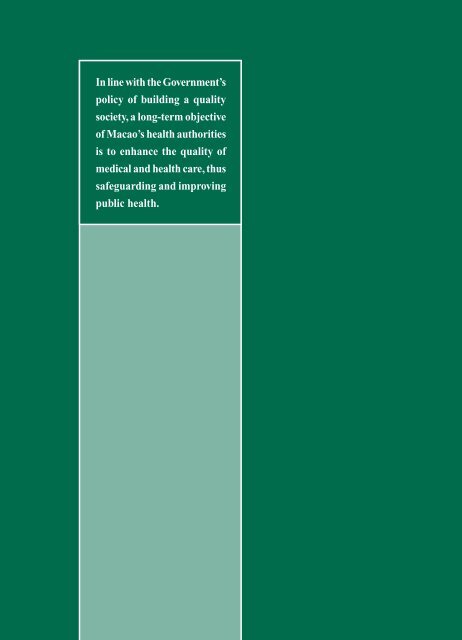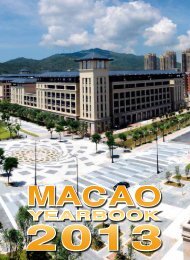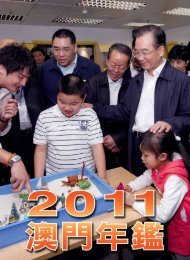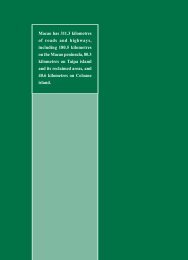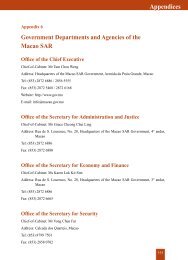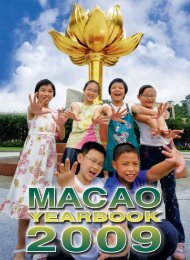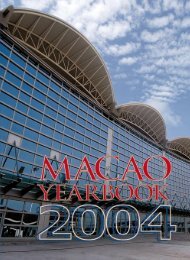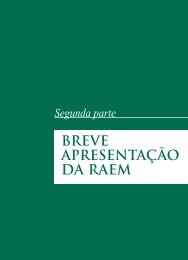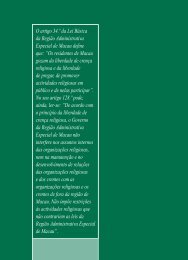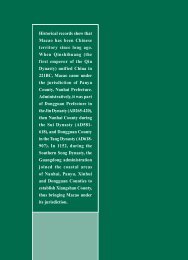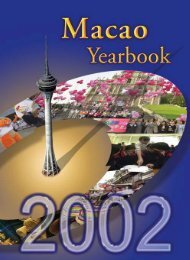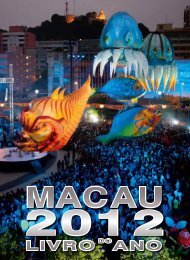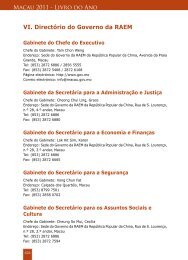Culture and Sport - Macao Yearbook
Culture and Sport - Macao Yearbook
Culture and Sport - Macao Yearbook
Create successful ePaper yourself
Turn your PDF publications into a flip-book with our unique Google optimized e-Paper software.
<strong>Culture</strong> <strong>and</strong> <strong>Sport</strong><br />
In line with the Government’s<br />
Chinese <strong>and</strong> policy Western of building cultures have a quality co-existed in <strong>Macao</strong> for over 400 years. A wide variety<br />
of cultural society, traditions, a long-term languages <strong>and</strong> objective values, religious beliefs, architectural styles, habits <strong>and</strong><br />
customs have all existed side by side <strong>and</strong> influenced one another. Out of this melting pot, a<br />
regional culture of <strong>Macao</strong>’s unique to health <strong>Macao</strong> authorities<br />
has gradually developed into its present richness <strong>and</strong> variety.<br />
<strong>Macao</strong>’s is culture to enhance is a diverse the mixture. quality It has of traditional Chinese culture as its heart, <strong>and</strong> it has<br />
assimilated medical Western, <strong>and</strong> particularly health Portuguese, care, thus cultural influences in perfect harmony.<br />
Following safeguarding its policy of <strong>and</strong> promoting improving Chinese culture while preserving the unique pluralistic<br />
cultural heritage of <strong>Macao</strong>, the MSAR Government has hosted various cultural <strong>and</strong> artistic<br />
activities <strong>and</strong> public invited health. art troupes from the mainl<strong>and</strong> <strong>and</strong> overseas, as well as <strong>Macao</strong>, to perform.<br />
These have created opportunities for audiences to learn more about the history, society, <strong>and</strong><br />
culture of different regions, as well as enhancing cultural exchange <strong>and</strong> the quality of cultural<br />
life of <strong>Macao</strong>’s residents.<br />
In addition, the <strong>Macao</strong> SAR Government provides financial support to local cultural<br />
associations <strong>and</strong> individual artists, enabling them to organise activities <strong>and</strong> create new works of<br />
art to further enrich <strong>Macao</strong>’s artistic life.<br />
Cultural Affairs Bureau<br />
The Cultural Affairs Bureau was established in September 1982. It aims to maintain, preserve<br />
<strong>and</strong> restore the cultural, historical <strong>and</strong> architectural heritage of <strong>Macao</strong>, <strong>and</strong> to develop regulations<br />
to ensure that it remains available for the public to enjoy. The promotion of research to help the<br />
community underst<strong>and</strong> <strong>Macao</strong>’s culture <strong>and</strong> heritage better is another of its goals. In addition,<br />
the Cultural Affairs Bureau supports the publication <strong>and</strong> distribution of local literature, the<br />
circulation of publications, <strong>and</strong> the establishment <strong>and</strong> maintenance of libraries <strong>and</strong> archives to<br />
promote reading <strong>and</strong> research. It encourages <strong>and</strong> subsidises cultural <strong>and</strong> artistic events, such<br />
as arts festivals, seminars <strong>and</strong> conferences. It also promotes the teaching of music, dance <strong>and</strong><br />
drama; <strong>and</strong> ensures the smooth running of the Museum of Macau <strong>and</strong> publicises its collections.<br />
Another of the bureau’s responsibilities is to organise cultural entertainment programmes,<br />
such as concerts, exhibitions, seminars, music classes, dance course <strong>and</strong> drama course, the<br />
<strong>Macao</strong> Youth Music Competition, <strong>Macao</strong> International Music Festival, <strong>Macao</strong> Arts Festival<br />
<strong>and</strong> the <strong>Macao</strong> Annual Visual Arts Exhibition. It provides subsidies <strong>and</strong> research bursaries to<br />
academics, <strong>and</strong> promotes the publication of research <strong>and</strong> advanced studies about the arts.<br />
17th <strong>Macao</strong> Arts Festival<br />
The 17th <strong>Macao</strong> Arts Festival was held from 11 March to 1 April, <strong>and</strong> featured a rich mix of<br />
performances encompassing music, dance, theatre, variety shows, <strong>and</strong> visual arts exhibition.<br />
The kaleidoscope of 18 programmes was presented by ensembles from Africa, Canada, Vietnam,<br />
Cuba, the Slovak Republic, Portugal, Germany, the Czech Republic, <strong>and</strong> the mainl<strong>and</strong>.<br />
The festival theme was “A showcase of cultures”. The venues were chosen so the free<br />
programmes could be more accessible to potential audience members. The Legend of the
Drummer Monkey, the opening show, was performed by Africa’s leading acrobatic arts troupe<br />
at Sai Van Lake Square. From the World Heritage sites of A-Ma Temple <strong>and</strong> Senado Square, to<br />
CHAPTER Clementina Leitao Ho Brito 10 Theatre in the North Zone, footprints of the arts festival covered the<br />
entire city.<br />
Artists’ workshops, master classes, lectures, guided tours <strong>and</strong> reviews were also conducted, so<br />
audiences could better appreciate the festival. About 87.9 percent of tickets were sold, <strong>and</strong> a total<br />
of 26,800 people participated in the festival.<br />
20th <strong>Macao</strong> International Music Festival<br />
With “Carrying on with Brilliance” as its theme, the 20th <strong>Macao</strong> International Music Festival<br />
was held from 6 October to 5 November. The celebrated Chinese pianist Lang Lang, the worldacclaimed<br />
conductor Semyon Bychkov, Canto-pop diva Paula Tsui, Japan’s “new godfather of<br />
music” Ryuichi Sakamoto, the Portuguese fado master Carlos do Carmo, <strong>and</strong> musicians from<br />
the Berlin Philharmonic <strong>and</strong> Berlin National Opera House gathered in <strong>Macao</strong> for the event.<br />
Along with other famous ensembles including Germany’s WDR Symphony Orchestra Cologne,<br />
Indonesia’s Batavia Madrigal Singers, Japan’s Orchestra Ensemble Kanazawa, Portugal’s Xutos e<br />
Pontapes, <strong>and</strong> Vienna Symphony Virtuosi, they left the most beautiful <strong>and</strong> lyrical imprint on the<br />
two-decade history of the festival with their distinctive music styles.<br />
The festival featured 30 performances, <strong>and</strong> a record 95 percent of tickets – 16,000 in all<br />
– were sold. Also, 14,000 people joined the six admission-free, large outdoor concerts, setting<br />
another record. Over 4,000 students <strong>and</strong> citizens participated in the 13 open master classes <strong>and</strong><br />
workshops. In addition, two performances were specially staged for the underprivileged. The<br />
festival also included a retrospective exhibition on past performances at local heritage sites. This<br />
exhibition toured local secondary schools <strong>and</strong> recaptured the mastery of celebrated musicians<br />
<strong>and</strong> musical groups from around the world, while allowing visitors to learn more about <strong>Macao</strong>’s<br />
cultural heritage.<br />
<strong>Macao</strong> Orchestra<br />
It has been four years since <strong>Macao</strong> Orchestra began arranging its schedule in the form of a<br />
concert season. The orchestra has introduced the world’s classical music to the public through<br />
its concerts. It also emphasised musical education for young people, by launching an event<br />
combining painting <strong>and</strong> exhibition to coincide<br />
Health<br />
with the 1 June International<br />
<strong>and</strong><br />
Children’s Day,<br />
<strong>and</strong> arranging the New Year Concert on Campus, <strong>and</strong> the First Musical Summer Camp for<br />
<strong>Macao</strong> Youth, all of which have been well received. During 2006, the orchestra held 65 concerts<br />
<strong>and</strong> performances, attracting a total audience of 38,016 people; the 23 campus concerts drew<br />
audiences totalling 4,808.<br />
Social Welfare<br />
The <strong>Macao</strong> Orchestra has collaborated with world acclaimed musicians <strong>and</strong> conductors<br />
including Lang Lang, Okko Kamu, Paik Kun-woo, <strong>and</strong> Lu Shao-chia. In March 2006, the<br />
orchestra presented a concert featuring works by <strong>Macao</strong>’s renowned composer Doming Lam,<br />
<strong>and</strong> a symposium on his creative achievements. Song of Pipa, a piece written by the <strong>Macao</strong>-born<br />
composer Lam Bun Ching, who lives in the United States, <strong>and</strong> Ye Xiaogang’s <strong>Macao</strong> Bride Suite<br />
No. 2, were premiered in December. These premieres exemplified <strong>Macao</strong> composers’ high regard<br />
for the orchestra, <strong>and</strong> helped to preserve <strong>and</strong> promote local cultural resources.
Loving Care (Photo: Chan Weng Chon [GCS])
Part 2 Chapter 10<br />
Health <strong>and</strong> Social Welfare<br />
Health <strong>and</strong> Social Welfare<br />
In line with the Government’s policy of building a quality society, a long-term objective of <strong>Macao</strong>’s<br />
health authorities is to enhance the quality of medical <strong>and</strong> health care, thus safeguarding <strong>and</strong><br />
improving public health.<br />
During 2008, the Health Bureau continued to implement its policy of “A sound health care<br />
system, putting prevention first”. Through improving the system, adjusting policies, allocation of<br />
resources <strong>and</strong> scientific management, the bureau actively develops a quality medical system <strong>and</strong><br />
provides full health services. To prevent <strong>and</strong> control severe epidemics, the Government strengthened<br />
the structure <strong>and</strong> functions of public health authorities, <strong>and</strong> formulated the corresponding laws <strong>and</strong><br />
ancillary measures to h<strong>and</strong>le different threats. It also developed response strategies <strong>and</strong> mechanisms<br />
to tackle new forms of p<strong>and</strong>emic influenza, thus strengthening disease prevention <strong>and</strong> control to<br />
practically safeguard citizens’ physical <strong>and</strong> mental health.<br />
Public Health<br />
The MSAR’s st<strong>and</strong>ard of public health care is comparable to that of developed countries <strong>and</strong> regions.<br />
According to Health Bureau statistics for 2008, the ratio of doctors to residents was one to 436,<br />
that of nurses to residents was one to 388, <strong>and</strong> that of hospital beds (excluding outpatient beds)<br />
to residents was one to 533. The general mortality rate was 3.2 per thous<strong>and</strong> inhabitants, while<br />
the mortality rate for infants under one year old was 3.2 per thous<strong>and</strong> live births. The average life<br />
expectancy in <strong>Macao</strong> was 82 years (2004-2007).<br />
According to the ICD-10-CM classification system (International Classification of Disease,<br />
Tenth Edition, Clinical Modification), malignant tumours were the biggest cause of death in <strong>Macao</strong>,<br />
while circulatory diseases <strong>and</strong> respiratory diseases ranked second <strong>and</strong> third, respectively. In 2008,<br />
these three categories accounted for 31 percent, 27.6 percent <strong>and</strong> 13.7 percent, respectively, of all<br />
deaths during the year.<br />
Health Bureau<br />
The Health Bureau is supervised by the Secretary for Social Affairs <strong>and</strong> <strong>Culture</strong>, <strong>and</strong> its functions<br />
are:<br />
• To plan <strong>and</strong> implement measures to protect public health <strong>and</strong> prevent disease;<br />
• To provide primary <strong>and</strong> specialist health care services, <strong>and</strong> take preventive measures in the<br />
event of any incidents that endanger public health;<br />
• To cooperate with other authorised agencies <strong>and</strong> assist in rehabilitating the sick;<br />
• To conduct research into health sciences;<br />
• To train or facilitate the training of health care professionals;<br />
• To supervise <strong>and</strong> support all entities working in the health sector;<br />
• To offer technical support to health units throughout <strong>Macao</strong>; <strong>and</strong><br />
• To provide forensic services.<br />
405
<strong>Macao</strong> <strong>Yearbook</strong> 2009<br />
Medical <strong>and</strong> Health Resources<br />
The <strong>Macao</strong> SAR Government devotes considerable resources to medical <strong>and</strong> health care. In 2008,<br />
the total expenditure on medical <strong>and</strong> health services was about 2.12 billion patacas, an increase of<br />
10 percent over the figure of 1.9 billion patacas for 2007.<br />
Medical <strong>and</strong> health services providers in <strong>Macao</strong> are classified as either governmental or nongovernmental.<br />
The former mainly include Government Health Centres that provide primary health<br />
care, as well as Conde S. Januario Hospital, which provides specialist medical services. The latter<br />
include medical entities subsidised by the Government <strong>and</strong> other institutions, such as Kiang Wu<br />
Hospital, the Workers’ Clinic <strong>and</strong> Tung Sin Tong Clinic, as well as various private clinics <strong>and</strong><br />
laboratories. The medical services provided by Government Health Centres <strong>and</strong> Tung Sin Tong<br />
Clinic are basically free of charge.<br />
Conde S. Januario Hospital<br />
Conde S. Januario Hospital has an area of 31,614 square metres, <strong>and</strong> a total floor area of 62,604<br />
square metres. It consists of four interconnected buildings <strong>and</strong> a helicopter pad.<br />
Conde S. Januario Hospital is a modern medical institution with advanced <strong>and</strong> comprehensive<br />
facilities. Its departments include Inpatient, Outpatient, Emergency, Surgery, Intensive Care,<br />
Coronary Intensive Care, Burns Service, Physiotherapy <strong>and</strong> Rehabilitation Medicine, Haemodialysis<br />
<strong>and</strong> Peritoneal Dialysis, Medical Imaging, Laboratory <strong>and</strong> Haematological Oncology. The 78 types<br />
of services offered by the Outpatient Department include Anaesthesiology, Cardiology, Surgery,<br />
Plastic <strong>and</strong> Reconstructive Surgery, Dermatology, Stomatology, Gynaecology <strong>and</strong> Obstetrics,<br />
Haematological Oncology, Physiotherapy <strong>and</strong> Rehabilitation, Internal Medicine, General Medicine,<br />
Nephrology, Neurosurgery, Ophthalmology, Orthopaedics, Otorhinolaryngology, Paediatrics, Chest<br />
Clinic, Psychiatry <strong>and</strong> Urology.<br />
According to the Health Bureau’s statistics for 2008, the Inpatient Department of Conde S.<br />
Januario Hospital had 501 beds, in 14 specialist wards. Its bed occupancy rate was 85.84 percent,<br />
<strong>and</strong> patients stayed in the hospital for an average of 9.15 days. The hospital’s emergency services<br />
covered three areas: General Emergency, Paediatric Emergency, <strong>and</strong> Gynaecological <strong>and</strong> Obstetric<br />
Emergency. The General Emergency service accounted for around 56 percent of patient visits, the<br />
highest of the three<br />
In 2008, Conde S. Januario Hospital had 359 doctors, 830 nurses <strong>and</strong> 586 beds (501 inpatient<br />
beds <strong>and</strong> 85 outpatient beds). It received 296,743 outpatients, <strong>and</strong> the daytime hospital treated 23,196<br />
patients. There were 175,457 emergency cases <strong>and</strong> 15,934 inpatients; 6,787 patients underwent<br />
operations <strong>and</strong> 2,135 gave birth in the hospital. A total of 3,459,129 diagnoses <strong>and</strong> examinations<br />
in support of treatments were conducted in the auxiliary department.<br />
Located on Taipa isl<strong>and</strong>, the Psychiatric Centre of Conde S. Januario Hospital has five floors<br />
<strong>and</strong> a total floor area of over 7,494.9 square metres. It provides medical, rehabilitation <strong>and</strong> judicial<br />
psychiatric services as well as teaching facilities, all under one roof. It has 126 beds, 81 of which<br />
are for inpatients <strong>and</strong> 45 for outpatients. During 2008, it accepted 994 new adult psychiatric<br />
outpatient cases.<br />
Conde S. Januario Hospital provides free medical services for the following categories of<br />
people of the <strong>Macao</strong> SAR: pregnant women, new mothers, children aged 10 or below, primary <strong>and</strong><br />
406
Health <strong>and</strong> Social Welfare<br />
secondary school students of formal education, teaching staff, patients suffering from infectious<br />
diseases, drug addicts, people with malignant tumours, the mentally ill, prisoners, people aged<br />
65 or above, <strong>and</strong> people holding proof of their personal financial st<strong>and</strong>ing (Card for Recipient of<br />
Financial Subsidy) issued by the Social Welfare Bureau.<br />
Health Centres<br />
To realise the objective of “Health for All” advocated by the World Health Organization (WHO),<br />
the Health Bureau has established Health Centres throughout the territory. The completion of a<br />
primary health care network with Health Centres as its operational units offers all <strong>Macao</strong> residents<br />
easy access to primary health care services in their own neighbourhoods.<br />
There are six Health Centres <strong>and</strong> two Health Stations distributed throughout the various districts<br />
of the <strong>Macao</strong> SAR. Of these, the Fai Chi Kei Health Centre <strong>and</strong> Areia Preta Health Centre also had<br />
traditional Chinese medicine clinics. In the year ending 31 December 2008, 105 doctors (including<br />
general practitioners, practitioners of Chinese medicine <strong>and</strong> dentists) <strong>and</strong> 144 nurses provided<br />
primary health care services to 481,265 outpatients. Most outpatients attended the adult health care,<br />
child health care <strong>and</strong> family planning clinics, which accounted for 59.45 percent, 13.17 percent<br />
<strong>and</strong> 8.59 percent, respectively, of total outpatient visits.<br />
Health Centres provide the following services:<br />
Prenatal Care, which ensures the health of both mothers <strong>and</strong> their babies during pregnancy<br />
through regular check ups. A total of 23,102 people used this service in 2008.<br />
Family Planning, which offers married couples the choice of planned parenthood. It reduces the<br />
occurrence of diseases among pregnant women, new mothers <strong>and</strong> their babies, lowers mortality<br />
rates, <strong>and</strong> raises the health <strong>and</strong> living st<strong>and</strong>ards of women <strong>and</strong> their families. Altogether, 41,370<br />
people used this service in 2008.<br />
Children’s Health Care, which serves children aged between birth <strong>and</strong> 13, providing them with<br />
regular medical check ups <strong>and</strong> consultations, physical examinations, vaccinations <strong>and</strong> fluoride<br />
supplements. It also teaches skills <strong>and</strong> knowledge about feeding <strong>and</strong> caring for babies <strong>and</strong> infants.<br />
A total of 63,385 people used this service in 2008.<br />
Adult Health Care, which provides health examinations, diagnosis, treatment <strong>and</strong> control<br />
of various common illnesses, especially chronic diseases such as hypertension, diabetes, <strong>and</strong><br />
chronic obstructive pulmonary disease. It also offers basic medication, laboratory tests <strong>and</strong> other<br />
supplementary check ups. In all, 286,141 people benefited from this service in 2008.<br />
Oral Health Care, which provides dental check ups, fissure-sealing, restoration <strong>and</strong> filling <strong>and</strong><br />
root-canal treatments, scaling <strong>and</strong> polishing <strong>and</strong> extractions. A total of 22,448 people used this<br />
service in 2008.<br />
Student Health Care, which provides physical check ups, vaccinations <strong>and</strong> health education to<br />
Primary One to Six students. In all, 4,227 people used this service in 2008.<br />
Health Education, which enhances health knowledge among residents, promotes the concept of<br />
“Prevention is Better than Cure” <strong>and</strong> encourages the practice of a healthy lifestyle; <strong>and</strong><br />
Traditional Chinese Medicine Services, which have been available in the Fai Chi Kei Health<br />
Centre since 1999, <strong>and</strong> in Areia Preta Health Centre since July 2006. In 2008, 34,900 patients<br />
407
<strong>Macao</strong> <strong>Yearbook</strong> 2009<br />
received these services.<br />
The free health care services provided by Health Centres also include family visits, referral,<br />
vaccination <strong>and</strong> other nursing services.<br />
Expenses for Medical Services<br />
All legal residents of <strong>Macao</strong>, regardless of their age or occupation, are entitled to free services<br />
at Health Centres <strong>and</strong> supplementary check ups at Conde S. Januario Hospital by referral from<br />
Health Centres. Non-residents pay for such services according to rates established by the Health<br />
Bureau.<br />
Patients other than those specified above must pay for services provided by Conde S. Januario<br />
Hospital. Fees are higher for non-residents.<br />
<strong>Macao</strong> Public Health Laboratory<br />
The <strong>Macao</strong> Public Health Laboratory is a department under the Health Bureau, <strong>and</strong> is responsible<br />
for providing general health care support. It had 69 members of staff at the end of 2008. It obtained<br />
ISO/IEC 17025:2005 certification in 2006.<br />
The laboratory provides laboratory support to agencies under the Health Bureau <strong>and</strong> other<br />
departments in <strong>Macao</strong>, <strong>and</strong> conducts research on public health (including monitoring environmental<br />
hygiene <strong>and</strong> infectious diseases) either on its own or in collaboration with other countries <strong>and</strong><br />
nearby regions.<br />
The laboratory provides testing services for food <strong>and</strong> water quality, medicine <strong>and</strong> infectious<br />
diseases. The infectious diseases it tests for include tuberculosis, parasites, HIV/AIDS, Norwalk<br />
virus, human T-cell leukaemia virus type-I/type-II, hepatitis virus, syphilis, EB virus, gastrointestinal<br />
virus, respiratory virus, dengue fever, influenza <strong>and</strong> SARS corona virus. In 2008, the laboratory<br />
tested 65,711 specimens, <strong>and</strong> performed a total of 206,827 laboratory tests.<br />
Prevention <strong>and</strong> Treatment of HIV Disease<br />
The number of HIV carriers worldwide has increased enormously in the past 20 years, which has<br />
become an alarming public health issue.<br />
The Commission on AIDS Prevention <strong>and</strong> Treatment was established by an order of the Chief<br />
Executive issued in November 2005. Its term was extended for another three years by an executive<br />
order issued in December 2008. Chaired by the Secretary for Social Affairs <strong>and</strong> <strong>Culture</strong>, the<br />
commission comprises members from both the Government <strong>and</strong> community groups, including the<br />
Health Bureau, the Social Welfare Bureau, the Education <strong>and</strong> Youth Affairs Bureau, the Unitary<br />
Police Service, <strong>Macao</strong> Prison, Kiang Wu Hospital, the School of Health Sciences of <strong>Macao</strong><br />
Polytechnic Institute, Kiang Wu Nursing College, Chinese Medical Association, the <strong>Macao</strong><br />
Association of Medical Practitioners, Macau Red Cross, Caritas de Macau, the <strong>Macao</strong> Federation<br />
of Trade Unions, the <strong>Macao</strong> General Neighbourhood Associations Union, <strong>and</strong> Tung Sin Tong<br />
Charitable Society. The commission’s mission is to design <strong>and</strong> promote measures to prevent <strong>and</strong><br />
control AIDS transmission in the MSAR, through cooperation among public departments <strong>and</strong><br />
community groups <strong>and</strong> organisations.<br />
408
Health <strong>and</strong> Social Welfare<br />
The department for the prevention, monitoring <strong>and</strong> control of infectious diseases of the Centre<br />
for Disease Control <strong>and</strong> Prevention of the Health Bureau acts as the Secretariat of the Commission<br />
on AIDS Prevention <strong>and</strong> Treatment. There are six dedicated task forces under the commission.<br />
A department of the <strong>Macao</strong> Public Health Laboratory, the HIV/AIDS Inquiry <strong>and</strong> Counselling<br />
Unit provides counselling on the prevention <strong>and</strong> control of sexually transmitted diseases. Its main<br />
duties include educating <strong>and</strong> counselling HIV carriers <strong>and</strong> those in need of information on the<br />
subject; providing enquiry services about confidentiality <strong>and</strong> medical referral services; arranging<br />
for employees of entertainment venues to have blood tests on a regular basis, <strong>and</strong> providing them<br />
with counselling, prevention education <strong>and</strong> information to raise their awareness of the potential<br />
dangers of contracting such diseases; <strong>and</strong> conducting educational sessions for students <strong>and</strong> certain<br />
groups of high-risk people.<br />
Blood Transfusion Centre<br />
The Blood Transfusion Centre (BTC), a department under the Health Bureau, is the only institution<br />
in <strong>Macao</strong> that provides blood, blood components, <strong>and</strong> a blood donation service. The centre had 39<br />
staff members during 2008. The centre adopts a policy of voluntary, unpaid <strong>and</strong> anonymous blood<br />
donation. Its primary responsibilities include providing local patients with adequate <strong>and</strong> safe blood<br />
<strong>and</strong> blood components. The centre received ISO 9001:2000 certification in 2003.<br />
It strictly follows st<strong>and</strong>ards set by the Council of Europe for conducting quality control of blood<br />
<strong>and</strong> blood products. It provides professional consultations concerning blood transfusions <strong>and</strong><br />
related medical diagnoses to hospitals in <strong>Macao</strong>. Moreover, it assists hospitals in developing correct<br />
applications for clinical blood transfusions; <strong>and</strong> in training medical <strong>and</strong> technical professionals.<br />
The rapidly developing economy, the influx of immigrants <strong>and</strong> the growing <strong>and</strong> ageing population<br />
have all contributed to ever-rising dem<strong>and</strong> for blood. The Blood Transfusion Centre must collect<br />
blood from at least 45 donors a day to meet the current dem<strong>and</strong> of <strong>Macao</strong>’s hospitals.<br />
In 2008, 15,240 residents registered as blood donors at the Blood Transfusion Centre. The<br />
centre collected 12,420 units of blood during the year; <strong>and</strong> prepared 35,195 units of different blood<br />
components for 2,969 patients of different hospitals. Its statistics show that about 2.6 percent of<br />
residents meeting eligible criteria donated blood, approximately 55 percent of whom donated more<br />
than once. Students (including secondary school <strong>and</strong> university students) accounted for 35 percent<br />
of the total donors, while persons from commercial <strong>and</strong> service industries accounted for 24 percent.<br />
Women accounted for 50.7 percent of the total donors; the main age bracket for blood donors was<br />
between 20 <strong>and</strong> 29, accounting for 41 percent.<br />
Department of Pharmaceutical Affairs<br />
The Department of Pharmaceutical Affairs is an administrative unit supervised by the Health<br />
Bureau. The department, with 43 employees in 2008, is composed of the Division of Monitoring<br />
<strong>and</strong> Management, <strong>and</strong> the Inspection <strong>and</strong> Licensing Division.<br />
The Department of Pharmaceutical Affairs is responsible for implementing regulations <strong>and</strong><br />
supervising all kinds of pharmaceutical activities related to western, Chinese <strong>and</strong> traditional<br />
medicines, to ensure residents receive safe, effective medications that meet quality st<strong>and</strong>ards.<br />
Specific duties include pre-market assessments of pharmaceutical quality, safety <strong>and</strong> efficacy;<br />
409
<strong>Macao</strong> <strong>Yearbook</strong> 2009<br />
registering pharmaceuticals that meet required st<strong>and</strong>ards; granting import licences to pharmaceutical,<br />
diagnostic <strong>and</strong> laboratory reagents; monitoring the quality <strong>and</strong> safety of drugs available in the local<br />
market; assessing <strong>and</strong> approving pharmacy licence applications, including those for pharmaceutical<br />
manufacturing licences, import <strong>and</strong> export licences, wholesale licences <strong>and</strong> operating licences<br />
of pharmacies <strong>and</strong> Chinese herbal stores; reviewing <strong>and</strong> granting applications for licences of<br />
pharmacists or pharmacy technicians; monitoring activities of pharmacies as well as pharmaceutical<br />
practitioners <strong>and</strong> punishing irregularities; regulating promotional activities related to pharmaceuticals<br />
<strong>and</strong> health products; <strong>and</strong> implementing the UN conventions regarding the trade <strong>and</strong> lawful use of<br />
narcotic drugs, psychotropic substances <strong>and</strong> chemical precursors.<br />
By the end of 2008, 21,200 kinds of western medicine had been launched in the local market<br />
with approval from the Health Bureau; of these, 6,801 were over-the-counter medicines, 13,310<br />
were prescription medicines <strong>and</strong> 1,089 could only be used by hospitals. A total of 5,600 kinds<br />
of Chinese <strong>and</strong> traditional medicine were licensed for sale in the local market. There were 209<br />
pharmacists <strong>and</strong> 143 pharmacy technicians registered with the Health Bureau. There were 114<br />
licensed wholesale stores with Health Bureau authorisation for conducting pharmaceutical import<br />
<strong>and</strong> export business. There were 71 licensed pharmaceutical stores, 133 Chinese herbal stores, 29<br />
pharmaceutical dealers <strong>and</strong> 20 pharmaceutical factories.<br />
Centre for Disease Control <strong>and</strong> Prevention<br />
The Centre for Disease Control <strong>and</strong> Prevention was established in October 2001 with the approval<br />
of the Secretary for Social Affairs <strong>and</strong> <strong>Culture</strong>. It reports to the Director of the Health Bureau. The<br />
centre plays a key role in implementing public health policies <strong>and</strong> disease-prevention <strong>and</strong> control<br />
measures. It is a technical unit responsible for the overall planning of public disease-prevention<br />
work.<br />
The Centre for Disease Control <strong>and</strong> Prevention has departments for the prevention, monitoring <strong>and</strong><br />
control of infectious diseases; the prevention <strong>and</strong> control of chronic diseases <strong>and</strong> the improvement<br />
of health; the environment <strong>and</strong> food hygiene; occupational health; <strong>and</strong> health planning. It also<br />
has a Tuberculosis Control Centre, a Vector Control Working Group, <strong>and</strong> six community-health<br />
working groups attached to various district health centres. The centre had 128 staff members at<br />
the end of 2008.<br />
The main aims of the Centre for Disease Control <strong>and</strong> Prevention in 2008 included: pressing<br />
ahead with capacity building; effective prevention <strong>and</strong> control of serious communicable diseases;<br />
intensifying the “Healthy City” Project; promoting food safety; launching <strong>and</strong> developing new<br />
public health initiatives; <strong>and</strong> ensuring the effective implementation of public health measures.<br />
Kiang Wu Hospital<br />
Kiang Wu Hospital is a non-governmental medical <strong>and</strong> health institution administered by the Kiang<br />
Wu Hospital Charitable Association of <strong>Macao</strong>. Established in 1871, it has a 137-year history as a<br />
charitable hospital founded <strong>and</strong> operated by Chinese people. Its mission is to serve the community<br />
<strong>and</strong> to offer patient-oriented medical services with diligence, love <strong>and</strong> courtesy. It has worked for the<br />
health of the common people of <strong>Macao</strong> <strong>and</strong> brought comfort to them for more than 100 years.<br />
Kiang Wu Hospital has developed into a modern general hospital that integrates treatment,<br />
410
Health <strong>and</strong> Social Welfare<br />
prevention, teaching <strong>and</strong> research; <strong>and</strong> it is currently implementing a modern information<br />
management system in phases. In 2008, the hospital had a staff of 1,492: 311 doctors, 418 nurses,<br />
244 technical professionals <strong>and</strong> 519 other employees.<br />
Kiang Wu Hospital has three departments: Emergency, Outpatient, Inpatient, Intensive Care Unit<br />
(ICU) <strong>and</strong> Cardiac Care Unit (CCU). These operate eight medical centres in addition to the Taipa<br />
Medical Centre, specialising in: cardiovascular, dialysis, hospice <strong>and</strong> palliative care, radiotherapy,<br />
endoscopy, health check, high-pressure oxygen treatment services. The hospital’s clinical services<br />
also cover internal medicine, surgery, paediatrics, obstetrics <strong>and</strong> gynaecology, Chinese medicine,<br />
oncology, stomatology, ophthalmology, rehabilitation, dermatology <strong>and</strong> otorhinolaryngology. In<br />
addition, the hospital has eight supporting departments dedicated to medical imaging, pharmacy,<br />
pathology, general examination, cardiac catheterisation, cardiac function examination, information<br />
technology <strong>and</strong> central sterilised supplies.<br />
Kiang Wu Hospital has an emergency department <strong>and</strong> three outpatient departments. During<br />
2008, its emergency <strong>and</strong> outpatient departments treated over 1.03 million patients, an average of<br />
3,130 per day. Its emergency department is open around the clock, <strong>and</strong> during 2008 treated over<br />
170,000 patients, an average of around 485 per day. A total of 26,000 patients were discharged<br />
from the hospital during the year. In 2008, Taipa Medical Centre received 105,000 patients seeking<br />
emergency <strong>and</strong> outpatient services, <strong>and</strong> treated 322 patients daily.<br />
University Hospital<br />
The University Hospital, an institution under the Macau University of Science <strong>and</strong> Technology<br />
(MUST) Foundation, is an integrated, modern hospital. It also serves as the clinical <strong>and</strong> teaching<br />
base for the Faculty of Chinese Medicine <strong>and</strong> Faculty of Health Sciences of the MUST. The hospital<br />
has a team of local professional medial staff <strong>and</strong> medical consultants from overseas, mainl<strong>and</strong><br />
China <strong>and</strong> Hong Kong.<br />
The hospital provides both western <strong>and</strong> Chinese medicines. Its internal medicine <strong>and</strong> surgery<br />
services cover a wide range of specialties, including cardiology, oncology, gastroenterology <strong>and</strong><br />
hepatology, psychiatry, clinical psychology, rheumatology, geriatrics <strong>and</strong> gerontology, blood<br />
transfusions, dietetics, urology, obstetrics <strong>and</strong> gynaecology, paediatrics, ophthalmology, dermatology,<br />
cosmetic surgery, orthopaedics, chiropractic, physical therapy, bone-setting, colo-proctology,<br />
acupuncture <strong>and</strong> Chinese manual therapy (Tuina therapy). In addition, it has established a Medical<br />
Imaging Diagnostic Centre, Preventive Care Centre, Integrated Oncology Centre, Clinical Laboratory<br />
Diagnostic Centre, Pathology Unit, Operating Theatre, Endoscopy Centre <strong>and</strong> Sleep Therapy Centre.<br />
The Obstetrics Unit <strong>and</strong> Paediatrics Unit are under construction.<br />
Upon completion of the first phase of its construction, the Inpatient Department had 60 beds,<br />
<strong>and</strong> there were double rooms, single rooms <strong>and</strong> luxury rooms. The Clinical Laboratory Diagnostic<br />
Centre of the University Hospital has joined the CAP Quality Assurance Programme <strong>and</strong> has<br />
gained accreditation from the National Association of Testing Authorities (NATA), an international<br />
laboratory accreditation authority recognised by the Australian government <strong>and</strong> internationally.<br />
Environmental Hygiene<br />
One of the major tasks of the Civic <strong>and</strong> Municipal Affairs Bureau is to improve <strong>and</strong> protect the<br />
urban environment, as well as to maintain a clean <strong>and</strong> tidy city. The bureau h<strong>and</strong>les complaints<br />
411
<strong>Macao</strong> <strong>Yearbook</strong> 2009<br />
about environmental hygiene, inspects urban hygiene, monitors the waste-disposal franchise<br />
company, manages l<strong>and</strong>fills, improves the facilities <strong>and</strong> distribution of refuse stations, organises<br />
city cleaning campaigns to promote awareness of environmental hygiene, maintains <strong>and</strong> manages<br />
public conveniences <strong>and</strong> prevents rat problems. The Civic <strong>and</strong> Municipal Affairs Bureau h<strong>and</strong>led<br />
8,076 complaints in 2008, mainly concerning refuse at vacant construction sites <strong>and</strong> buildings,<br />
water dripping from air conditioners, refuse stations, rat problems, occupation of public space,<br />
smoke <strong>and</strong> exhaust fumes, overflowing sewage <strong>and</strong> noise pollution. In recent years, the Civic <strong>and</strong><br />
Municipal Affairs Bureau has begun constructing closed refuse tips, which will eventually replace<br />
street litterbins. These efforts are expected to greatly improve the hygiene conditions of refuse<br />
collection facilities.<br />
Cemeteries<br />
<strong>Macao</strong> has six public cemeteries <strong>and</strong> 11 private cemeteries. The public cemeteries include the<br />
<strong>Macao</strong> St Michael’s Cemetery, <strong>Macao</strong> Our Lady of Piety Cemetery, Sa Kong Cemetery <strong>and</strong> Carmo<br />
Cemetery on Taipa, <strong>and</strong> Va Ian (Chinese) Cemetery on Coloane.<br />
The private cemeteries include the Parsee Cemetery; Morrison Chapel <strong>and</strong> the Old Protestant<br />
Cemetery; Mong Ha New Cemetery; <strong>Macao</strong> Mosque <strong>and</strong> Cemetery; Kai Fong (Neighbourhood)<br />
Cemetery, Pao Choc (Firecrackers) Cemetery, <strong>and</strong> Hao Si Cemetery on Taipa; <strong>and</strong> Kok Ip Cemetery,<br />
Ha Sac Cemetery, Ka Ho Cemetery <strong>and</strong> Son I Cemetery on Coloane.<br />
Public cemeteries are managed directly by the Civic <strong>and</strong> Municipal Affairs Bureau. They include<br />
11,229 grave plots, 5,629 of which are available for lease, as well as 18,163 ossuaries <strong>and</strong> cremation<br />
urns. The bureau is also authorised to supervise the operations of private cemeteries.<br />
Environmental Protection <strong>and</strong> Clean City Education<br />
Environmental Information <strong>and</strong> Education Centres<br />
<strong>Macao</strong> currently operates three environmental information <strong>and</strong> education centres. These are the<br />
Mong Ha Environment Information Centre, the Flora Garden Environment Information Centre, <strong>and</strong><br />
the Taipa Gr<strong>and</strong>e Environment Education Centre. These centres have been established to spread the<br />
message about environmental protection among the <strong>Macao</strong> public, <strong>and</strong> to raise people’s awareness<br />
of the need to protect the environment.<br />
Mong Ha Environment Information Centre<br />
Mong Ha Environment Information Centre, the first such centre in <strong>Macao</strong>, was opened on 14 March<br />
1999. It is equipped with broadb<strong>and</strong> Internet access, reading rooms, video viewing rooms, an<br />
archive of 1,542 volumes of Chinese <strong>and</strong> foreign-language educational materials on environmental<br />
protection, <strong>and</strong> 65 informational films. It also boasts a greenhouse <strong>and</strong> a small farm, so that students<br />
can experience the fun of growing plants. It holds regular activities, including lectures <strong>and</strong> practical<br />
exercises in recycling waste paper, making h<strong>and</strong>icrafts from waste materials, film screenings, tours<br />
of public parks, greenhouse cultivation workshops, seminars <strong>and</strong> experimental farming. Over 8,068<br />
people visited the centre during 2008.<br />
412
Health <strong>and</strong> Social Welfare<br />
Flora Garden Environment Information Centre<br />
Flora Garden Environment Information Centre was opened on 6 January 2001. It is equipped with<br />
broadb<strong>and</strong> Internet access, reading rooms, video viewing rooms, exhibition halls, a mini-laboratory<br />
<strong>and</strong> multi-purpose rooms. The centre also houses 1,989 reference works about environmental<br />
protection in Chinese <strong>and</strong> foreign languages, 79 informational films, <strong>and</strong> models of wetl<strong>and</strong>s <strong>and</strong><br />
renewable power generation systems. It regularly holds fun activities to promote environmental<br />
protection. Over 24,688 people visited the centre during 2008.<br />
Taipa Gr<strong>and</strong>e Environment Education Centre<br />
Taipa Gr<strong>and</strong>e Environment Education Centre began operations on 5 June 2001. It is an ideal place<br />
for visitors to study ways to conserve <strong>and</strong> recycle energy <strong>and</strong> reduce waste at the municipal level.<br />
Students, teachers <strong>and</strong> social groups can exchange ideas <strong>and</strong> learn from each other there.<br />
The 280-square-metre centre highlights environmental protection <strong>and</strong> functionality in both<br />
its design <strong>and</strong> construction. For instance, its toilet water comes from collection <strong>and</strong> treatment<br />
of rainwater through an environmental installation. The Information Station provides broadb<strong>and</strong><br />
Internet facilities, 620 books in Chinese <strong>and</strong> other languages, 16 informational films, <strong>and</strong> educational<br />
models. The Demonstration Area is equipped with solar energy collection devices, a wind energy<br />
power generator, a petroleum gas engine model, a waste separation <strong>and</strong> recycling model, a rainwater<br />
collection display, a sewage treatment model, <strong>and</strong> an organic manure production display. In its<br />
Environmental Protection Workshop, visitors can learn to make veined leaf specimens, dried<br />
flowers, recycled paper, ecological boxes <strong>and</strong> other environmentally friendly products. Over 2,528<br />
people visited the centre in 2008.<br />
Oscar’s Farm<br />
Oscar’s Farm, on Cheoc Van Road in Coloane, opened during the “Green Week” in 2005. It features<br />
villas, camp sites, <strong>and</strong> large huts for holding group activities, parties <strong>and</strong> h<strong>and</strong>icraft workshops, as<br />
well as sites with both leisure <strong>and</strong> entertainment functions including the chess game zone, teahouse,<br />
performance stage, Tyrolean traverse platform, BBQ zone, fitness zone <strong>and</strong> the children’s playground.<br />
It also has an organic farm <strong>and</strong> an orchard. The farm, which combines natural environment <strong>and</strong><br />
farming education, is a healthy place for residents to relax <strong>and</strong> entertain themselves.<br />
Occupying 7,000 square metres, Oscar’s Farm is the only organic farm in <strong>Macao</strong>.<br />
In 2008, it received 56 applications for using its facilities, <strong>and</strong> a total of 3,649 people visited<br />
Oscar’s Farm.<br />
Coloane Seac Pai Van Nature Education Centre<br />
The two-storey Coloane Seac Pai Van Nature Education Centre was opened during the 2007 Green<br />
Week. It has a multi-functional audio-visual room, a library corner <strong>and</strong> Internet zone, a permanent<br />
exhibition zone, a thematic exhibition zone <strong>and</strong> a nature workshop, <strong>and</strong> is a perfect place to learn<br />
natural science <strong>and</strong> environmental awareness. Other than holding regular exhibitions, the centre<br />
also provides fun parent-child activities, classes on topics of interest <strong>and</strong> other programmes. Over<br />
31,502 people visited the centre in 2008.<br />
413
<strong>Macao</strong> <strong>Yearbook</strong> 2009<br />
Nature Information Station<br />
There are now two nature information stations in <strong>Macao</strong>: the Guia Hill nature information station<br />
<strong>and</strong> the Flower City Garden nature information station. The stations are established to promote nature<br />
conservation <strong>and</strong> <strong>Macao</strong>’s natural ecological environment, helping citizens <strong>and</strong> tourists to know more<br />
about the facilities <strong>and</strong> the flora <strong>and</strong> fauna in the green zones. It aims to raise people’s awareness of<br />
protecting <strong>and</strong> greening the environment, as well as efficiently use the green facilities.<br />
Green Week<br />
The Civic <strong>and</strong> Municipal Affairs Bureau hosted the 27th Green Week in <strong>Macao</strong>, with assistance<br />
from the <strong>Macao</strong> Federation of Trade Unions, <strong>Macao</strong> General Neighbourhood Associations Union<br />
<strong>and</strong> the Women’s General Association of Macau. The event was held from 15 to 23 March 2008,<br />
with the slogan “Living in harmony with nature, enjoying a healthy life”.<br />
In all, over 85,000 people participated in the 47 activities held during the 27th Green Week<br />
in <strong>Macao</strong>, which is more than in previous campaigns; 2,851 trees were planted <strong>and</strong> 3,000 potted<br />
plants were given out.<br />
Youth Environmental Protection Ambassadors<br />
The <strong>Macao</strong> Youth Environmental Protection Ambassadors programme, organised by the Civic <strong>and</strong><br />
Municipal Affairs Bureau, aims to educate young students about environmental protection during<br />
their spare time, <strong>and</strong> encourages them to disseminate relevant information to their schoolmates,<br />
thereby contributing to the promotion of environmental protection. By 2008, the programme had<br />
been held for seven successive years.<br />
Elderly Ambassadors of Urban Cleaning<br />
Launched by the Civic <strong>and</strong> Municipal Affairs Bureau, the Elderly Ambassadors of Urban Cleaning<br />
programme is designed to promote urban cleaning. The ambassadors’ activities include visits to<br />
environmental protection facilities, training sessions, urban cleaning promotions <strong>and</strong> relevant<br />
cultural, recreational <strong>and</strong> sports activities. The programme was in its fourth year in 2008.<br />
Food Hygiene<br />
Monitoring food hygiene <strong>and</strong> enforcing quarantine <strong>and</strong> inspection protocols are duties of the<br />
Civic <strong>and</strong> Municipal Affairs Bureau. In accordance with relevant regulations, most imported foods<br />
(primarily animal <strong>and</strong> plant products) are subject to compulsory quarantine <strong>and</strong> inspection before<br />
being placed on the market.<br />
The bureau’s quarantine personnel conduct hygiene inspections of imported foodstuffs, such as<br />
livestock, meat, vegetables <strong>and</strong> fishery products, as well as other perishable food originating from<br />
animals or vegetables. These inspections are conducted at the Border Gate quarantine station, fish<br />
quarantine stations, wholesale markets, Macau Slaughter House, Inner Harbour piers, the airport,<br />
<strong>and</strong> the COTAI quarantine station.<br />
As the global climate, economy <strong>and</strong> environment continue to change, the Civic <strong>and</strong> Municipal<br />
414
Health <strong>and</strong> Social Welfare<br />
Affairs Bureau has strengthened its product quality inspection <strong>and</strong> control measures. It has also<br />
made sample inspection procedures for imported livestock <strong>and</strong> foodstuffs more stringent, in order<br />
to prevent the outbreak of infectious diseases among humans <strong>and</strong> animals in <strong>Macao</strong> <strong>and</strong> to control<br />
the inappropriate processing of livestock, fresh <strong>and</strong> frozen poultry, vegetables <strong>and</strong> perishable<br />
foodstuffs. All imported foodstuffs – including vegetables, live poultry, fish, fresh <strong>and</strong> frozen<br />
meat, eggs, fruits <strong>and</strong> canned goods – must now be inspected, quarantined <strong>and</strong> tested for residual<br />
pesticides, while poultry must be tested for avian flu. In addition, the bureau is responsible for<br />
food hygiene inspection of shops selling meat, vegetables <strong>and</strong> fish, <strong>and</strong> issuing licences to them. It<br />
carries out regular “hygiene blitzes”, <strong>and</strong> it has introduced a grading system to monitor the hygiene<br />
<strong>and</strong> safety of fresh live food.<br />
The Civic <strong>and</strong> Municipal Affairs Bureau effectively carries out its inspection <strong>and</strong> quarantine<br />
responsibilities through cooperation <strong>and</strong> the exchange of information with the <strong>Macao</strong> Customs<br />
Service, the Health Bureau, the Economic Services Bureau <strong>and</strong> counterparts of these organisations<br />
in neighbouring regions.<br />
Veterinary Health<br />
The Inspection <strong>and</strong> Veterinary Control Division, under the supervision of the Civic <strong>and</strong> Municipal<br />
Affairs Bureau, is mainly responsible for preventing <strong>and</strong> controlling infectious animal diseases. Its<br />
duties include animal health inspection, quarantine of imported <strong>and</strong> exported animals, education<br />
regarding <strong>and</strong> promotion of animal hygiene, <strong>and</strong> licensing retail sites of live domestic fowl, wild<br />
animals <strong>and</strong> pets. It is also responsible for issuing pet dog licences. In 2008, it licensed nine retail<br />
sites for live domestic fowl, one for wild animals <strong>and</strong> 19 for pets; <strong>and</strong> impounded 657 stray dogs<br />
<strong>and</strong> 181 cats <strong>and</strong> issued 8,863 dog licences.<br />
The Civic <strong>and</strong> Municipal Affairs Bureau has established two dog pounds, which are responsible<br />
for issuing pet dog licences, providing rabies vaccinations for pet dogs <strong>and</strong> cats, providing diagnoses<br />
<strong>and</strong> treatment for pets, sheltering ab<strong>and</strong>oned <strong>and</strong> stray animals, providing animal quarantine,<br />
h<strong>and</strong>ling matters concerning pet adoptions, issuing animal health certificates <strong>and</strong> providing corpse<br />
h<strong>and</strong>ling <strong>and</strong> cremation services.<br />
Wet Markets<br />
There are nine wet markets in <strong>Macao</strong>: seven on the <strong>Macao</strong> peninsula <strong>and</strong> one each on the isl<strong>and</strong>s<br />
of Taipa <strong>and</strong> Coloane. These house a total of 1,165 vending stalls. The stalls are operated by 950<br />
tenants <strong>and</strong> temporary mobile stall licensees, assisted by 501 helpers <strong>and</strong> 660 employees.<br />
In 2008, a total of 2,111 people were involved in running market stalls. The Civic <strong>and</strong> Municipal<br />
Affairs Bureau manages wet markets <strong>and</strong> h<strong>and</strong>les tenancy affairs.<br />
Hawkers<br />
The Civic <strong>and</strong> Municipal Affairs Bureau licenses, manages <strong>and</strong> monitors hawkers. In addition, it<br />
manages various big <strong>and</strong> temporary sales activities, such as sales of firecrackers <strong>and</strong> the Lunar New<br />
Year’s Eve Market, during major Chinese traditional festivals, as well as special markets like the<br />
Taipa Flea Market. During 2008, the bureau issued 1,314 licences, including 249 cooked food stall<br />
licences <strong>and</strong> 80 special permits to flower hawkers from the Wanzai District of Zhuhai Municipality,<br />
415
<strong>Macao</strong> <strong>Yearbook</strong> 2009<br />
68 fewer licences or a 4.92 percent decrease over the 2007 figures.<br />
Slaughterhouse<br />
In accordance with relevant regulations, livestock, such as pigs, cattle <strong>and</strong> sheep, must be slaughtered<br />
at Macau Slaughter House. The Civic <strong>and</strong> Municipal Affairs Bureau stations veterinarians <strong>and</strong><br />
quarantine personnel in the slaughterhouse to supervise its operations <strong>and</strong> hygiene. All slaughtered<br />
products must be checked before <strong>and</strong> after killing, <strong>and</strong> certified fit for human consumption before<br />
they can be sold. The bureau is also responsible for protecting animal rights, preventing abuse,<br />
supervising the transportation of livestock <strong>and</strong> destroying sub-st<strong>and</strong>ard meat.<br />
416<br />
In 2008, the slaughterhouse butchered 96,527 heads of cattle, suckling pigs, pigs <strong>and</strong> sheep.<br />
Social Welfare<br />
The <strong>Macao</strong> SAR Government designs its social welfare policies in conjunction with nongovernmental<br />
agencies; so that governmental <strong>and</strong> non-governmental organisations both deliver<br />
practical social services that meet residents’ needs <strong>and</strong> help distressed individuals <strong>and</strong> families<br />
<strong>and</strong> disadvantaged communities to resume normal social functioning <strong>and</strong> improve their living<br />
st<strong>and</strong>ards. The Social Welfare Bureau spent over 740 million patacas on social welfare services in<br />
2008, an increase of 47.43 percent.<br />
In 2005, the MSAR Government started to offer the Old-age Allowance to elderly <strong>Macao</strong><br />
permanent residents aged 65 or above. The allowance was delivered to the eligible elderly in a<br />
lump sum in October every year. In 2008, the Old-age Allowance was 1,800 patacas a year. A total<br />
of 38,603 applications were approved. Furthermore, to ease the impact of inflation on residents,<br />
especially the disadvantaged <strong>and</strong> the low income groups, the MSAR Government offered an extra<br />
payout to 38,915 eligible applicants in May, in meeting the needs of the community. In 2008, a<br />
total of 139,532,400 patacas were paid in allowances for the elderly.<br />
Social Welfare Bureau<br />
The Social Welfare Bureau (formerly the Commission for Assistance <strong>and</strong> Beneficence) was founded<br />
in 1938. In 1999, it was reorganised in accordance with its new organic law. The bureau’s original<br />
structure was also changed to emphasise family services <strong>and</strong> community assistance. Its scope of<br />
services was widened to include issues such as the prevention of drug dependence. These changes<br />
have made it more efficient <strong>and</strong> effective in solving personal, family <strong>and</strong> community problems,<br />
<strong>and</strong> supporting <strong>Macao</strong>’s residents in achieving the goal of “Helping Those in Need <strong>and</strong> Creating<br />
a New Life Together”.<br />
The Social Welfare Bureau provides services for individuals <strong>and</strong> families, children <strong>and</strong> youth,<br />
the disabled <strong>and</strong> the elderly. It also offers anti-drug-dependence services, as well as treatment <strong>and</strong><br />
social rehabilitation for drug dependents. Its social service facilities include recreational <strong>and</strong> multi<br />
service centres for the elderly, a casualty centre for victims of disasters, the Chi Ai Hin – a counselling<br />
centre for problem gamblers, Assessment Centre for Rehabilitation, Healthy Life Education Centre,<br />
the Anti-drug Education Resource Centre <strong>and</strong> the Treatment <strong>and</strong> Social Rehabilitation Service for<br />
Drug Dependence.
Health <strong>and</strong> Social Welfare<br />
Family Services<br />
The Social Welfare Bureau has established five social services centres in <strong>Macao</strong>, providing<br />
individuals <strong>and</strong> families in need with general services, including personal <strong>and</strong> family counselling,<br />
financial aid, round-the-clock support, disaster relief <strong>and</strong> referral services.<br />
In addition, the bureau provides crisis coordination <strong>and</strong> counselling services for families with<br />
special problems. Individuals <strong>and</strong> families suffering from domestic violence, such as spouse<br />
abuse, child abuse or elderly abuse, <strong>and</strong> those suffering from serious emotional problems, such<br />
as suicidal tendencies, are provided with cross-disciplinary professional treatment services that<br />
include personalised treatment, round-the-clock crisis intervention, group therapy <strong>and</strong> legal<br />
consultations.<br />
A 24-hour counselling service hotline provides ad-hoc telephone counselling <strong>and</strong> follow-up<br />
face-to-face counselling services for people in need. In 2008, the hotline h<strong>and</strong>led 845 cases.<br />
Chi Ai Hin, which is under the supervision of the Social Welfare Bureau’s Department of Family<br />
<strong>and</strong> Community Service, is a counselling centre for problem gamblers <strong>and</strong> their family members.<br />
It provides telephone counselling, personal <strong>and</strong> family counselling <strong>and</strong> organises community<br />
activities. In 2008, Chi Ai Hin h<strong>and</strong>led 77 cases <strong>and</strong> answered 457 hotline calls. It held 25 lectures<br />
<strong>and</strong> workshops concerning gambling prevention in the community, which were attended by 1,797<br />
people. It hosted <strong>and</strong> participated in a large community activity concerning prevention of problem<br />
gambling. Additionally, it commissioned the Institute for the Study of Commercial Gaming (ISCG)<br />
of the University of Macau to conduct research on casino personnel’s participation in gambling<br />
in <strong>Macao</strong>.<br />
At the end of 2008, <strong>Macao</strong> had one public casualty centre, 11 non-profit-making family service<br />
centres (10 of which were subsidised), <strong>and</strong> one non-profit-making counselling agency, as well as<br />
four non-profit-making temporary shelters (three of which were subsidised), to improve the quality<br />
of domestic life <strong>and</strong> prevent domestic problems. During 2008, 30 people were admitted to the Ilha<br />
Verde Centre for Victims of Disasters, <strong>and</strong> 27 people used the cold/wind shelter service on 547<br />
occasions. A total of 106,703 people used services provided by the 10 subsidised family service<br />
centres. The three subsidised non-profit-making temporary shelters housed 314 people; while one<br />
subsidised counselling agency provided services to 9,274 people.<br />
Community Services<br />
Fourteen non-profit-making community centres provide services to the public in <strong>Macao</strong>. Of these,<br />
13 are subsidised by the Social Welfare Bureau. They offer facilities such as study rooms, areas<br />
for ball games <strong>and</strong> children’s reading rooms. Activities such as lectures, exhibitions, major evening<br />
entertainments, dances <strong>and</strong> other events of interest are also held on a regular basis.<br />
During 2008, 8,958 people received various types of assistance <strong>and</strong> services from the Social<br />
Welfare Bureau’s Department of Family <strong>and</strong> Community Service on 23,285 occasions. The<br />
assistance <strong>and</strong> services included financial aid; individual or family counselling; day-care, child-care<br />
<strong>and</strong> hostel services; <strong>and</strong> referrals for domestic help services. Moreover, the five social services<br />
centres conducted 14,372 face-to-face counselling sessions for 7,877 residents <strong>and</strong> 4,931 home<br />
visits for 3,792 residents to cater for the various needs of individual cases. The bureau disbursed<br />
over 229,142,872 patacas in the form of regular financial assistance to 12,306 people in 6,180<br />
417
<strong>Macao</strong> <strong>Yearbook</strong> 2009<br />
families.<br />
In order to enhance welfare recipients’ incentives to work <strong>and</strong> encourage them to re-enter the<br />
labour market, the Social Welfare Bureau <strong>and</strong> four non-governmental organisations cooperated in<br />
implementing the Community Employment Assistance Scheme. By the end of 2008, the scheme<br />
had 101 participants. Additionally, by the end of 2008, the Positive Life Programme, which was<br />
launched to encourage employment, maintained 275 individual accounts for unemployed people,<br />
138 of whom had already received employment counselling <strong>and</strong> accepted job referrals.<br />
Children’s <strong>and</strong> Youth Services<br />
<strong>Macao</strong> currently has 33 child-care centres; of which 31 are non-profit-making (27 of these are<br />
subsidised by the Social Welfare Bureau) <strong>and</strong> two are profit making. They are dedicated to sharing<br />
parents’ responsibilities for taking care of children, providing favourable conditions for children’s<br />
mental <strong>and</strong> physical development. In 2008, the child-care centres took in 3,281 young children.<br />
The nine non-profit-making homes for children <strong>and</strong> adolescents subsidised by the Social<br />
Welfare Bureau provide a healthy living environment <strong>and</strong> short or long-term care <strong>and</strong> counselling<br />
for orphans, as well as children <strong>and</strong> adolescents who have been ab<strong>and</strong>oned, who lack family care,<br />
or who are on the verge of a crisis as a result of family or social conflicts. In 2008, the nine homes<br />
housed 439 children <strong>and</strong> youngsters.<br />
<strong>Macao</strong> has two non-profit-making community youth service teams. The team members, who<br />
are professional social workers, visit video game arcades, playgrounds <strong>and</strong> fast-food outlets, in<br />
order to become acquainted with vulnerable young people <strong>and</strong> help them to confront <strong>and</strong> solve<br />
personal, family <strong>and</strong> peer-relationship problems. The social workers also strive to strengthen ties<br />
between adolescents, their families, schools <strong>and</strong> communities, <strong>and</strong> to raise public awareness of the<br />
problems <strong>and</strong> needs of adolescents. Apart from outreach services, they also provide counselling<br />
services related to youth career development, family support for problem youngsters, community<br />
support <strong>and</strong> prevention of drug abuse. In 2008, 9,724 people participated in activities organised<br />
by the outreach teams.<br />
The Social Welfare Bureau is the only authorised organisation in <strong>Macao</strong> that deals with adoption<br />
services. It h<strong>and</strong>led 73 such cases in 2008. In addition, the bureau is responsible for providing<br />
assistance to minors who become involved in judicial actions, in accordance with the social<br />
protection system. During 2008, the bureau processed 247 such cases <strong>and</strong> h<strong>and</strong>led 12 cases under<br />
the community support programme.<br />
Services for the Elderly<br />
In 2008, the Government continued to improve the living conditions of <strong>Macao</strong>’s elderly, by<br />
financing <strong>and</strong> offering technical assistance to non-governmental organisations, to establish various<br />
service facilities <strong>and</strong> promote community support services. The service quality was thus enhanced,<br />
providing the elderly with a caring <strong>and</strong> respectful environment, so they can spend their latter years<br />
in comfort <strong>and</strong> dignity.<br />
<strong>Macao</strong> has 19 homes for the elderly; nine of them are non-profit-making (all of which are<br />
subsidised by the Social Welfare Bureau) <strong>and</strong> 10 are private (nine being profit-making <strong>and</strong> one being<br />
non-profit-making). These provide residential services for individuals who cannot live in their own<br />
418
Health <strong>and</strong> Social Welfare<br />
homes for various reasons. In 2008, 1,080 senior citizens were housed in homes for the elderly.<br />
<strong>Macao</strong> also has one public <strong>and</strong> six non-profit-making day centres for the elderly, <strong>and</strong> three<br />
non-profit-making multi-service centres, all of which are subsidised by the Social Welfare Bureau.<br />
These provide day care, nursing <strong>and</strong> rehabilitation for elderly people in failing health. In addition,<br />
one public <strong>and</strong> 22 non-profit-making social centres for the elderly organise social, recreational <strong>and</strong><br />
educational activities with subventions from the Social Welfare Bureau.<br />
In 2008, the 10 day care centres for the elderly provided services to 2,844 elderly people, while<br />
the 23 recreational centres provided services to 5,036 people.<br />
There are four Home Help <strong>and</strong> Community Support Teams in <strong>Macao</strong>, which are attached to three<br />
day centres <strong>and</strong> a day care centre for the elderly. The teams provide homecare <strong>and</strong> rehabilitation<br />
services to the elderly in need, as well as better support for physically frail senior citizens living in<br />
the community. Their services are divided into two categories: basic services <strong>and</strong> support services.<br />
Basic services include homecare services (such as meal deliveries, home cleaning, bathing, personal<br />
care, laundry, escorting the elderly <strong>and</strong> accompanying them when they receive medical services,<br />
shopping, <strong>and</strong> other assistance outside their homes) <strong>and</strong> psychological <strong>and</strong> social support services<br />
(individual counselling, home visits, support via the phone, <strong>and</strong> communal mutual-aid network<br />
activities). Support services include nursing <strong>and</strong> rehabilitation services. In 2008, the teams provided<br />
such services to 523 senior citizens, 338 of whom were living alone.<br />
The Caring Service Network for the Aged is another programme in which volunteers regularly<br />
visit <strong>and</strong> show their concern for elderly single people, giving them the warm feeling of being cared<br />
for by society. In 2008, the network provided services to 976 senior citizens who lived alone.<br />
Senior Citizen’s Card<br />
Citizens holding <strong>Macao</strong> Resident Identity Cards aged 65 or above are eligible to apply for the Senior<br />
Citizen’s Card. Senior Citizen’s Card holders are entitled to the welfare <strong>and</strong> benefits offered by<br />
the public organisations <strong>and</strong> enterprises that have signed cooperation agreements with the Social<br />
Welfare Bureau. By the end of 2008, the Social Welfare Bureau had issued a cumulative total of<br />
30,121 Senior Citizen’s Cards.<br />
Rehabilitation Services<br />
<strong>Macao</strong> has five non-profit-making rehabilitation homes, all of which are subsidised by the Social<br />
Welfare Bureau. Four of these provide residential care, vocational training <strong>and</strong> social <strong>and</strong> recreational<br />
services for mentally disabled adults, the chronically mentally ill, <strong>and</strong> children under 15 who are<br />
either mentally or physically disabled. The other is a halfway house for patients who are recovering<br />
from psychiatric illness. Eight non-profit-making day care centres subsidised by the Government<br />
provide services such as training for independent living, group learning, physiotherapy, social<br />
activities <strong>and</strong> personal assistance to the deaf, the mentally disabled, people recovering from mental<br />
illness <strong>and</strong> the visually impaired. During 2008, the five homes provided residential services to 320<br />
people, while the eight day-care centres provided rehabilitation services to 907 people.<br />
At present, six subsidised sheltered workshops, vocational training centres <strong>and</strong> supported<br />
employment centres assist the disabled. They help to make the disabled aware of their own potential<br />
<strong>and</strong> employment capabilities, <strong>and</strong> encourage them to become “self-confident, self-reliant <strong>and</strong> self-<br />
419
<strong>Macao</strong> <strong>Yearbook</strong> 2009<br />
empowering”. In 2008, they provided services to 296 people.<br />
Two non-profit-making pre-school education centres <strong>and</strong> education centres subsidised by the<br />
Social Welfare Bureau provide early special education <strong>and</strong> training for children with developmental<br />
or behavioural problems under the age of six, <strong>and</strong> for deaf children aged from one to 18; thus<br />
facilitating the development of their intelligence, linguistic <strong>and</strong> social skills, <strong>and</strong> mobility. The two<br />
pre-school education centres <strong>and</strong> education centres provided services to 180 people during 2008.<br />
The rehabilitation bus service in <strong>Macao</strong> is provided by two non-profit-making agencies. The<br />
MSAR Government subsidises the cost of purchasing <strong>and</strong> operating rehabilitation buses. The service<br />
enables people with impaired mobility, the physically disabled <strong>and</strong> patients requiring renal dialysis<br />
to commute between their homes <strong>and</strong> hospitals or Health Centres. Rehabilitation buses provided<br />
transport services to 16,583 people during 2008.<br />
The non-emergency ambulance transport service conveys patients with physical disabilities in<br />
an ambulance between their homes <strong>and</strong> hospitals. In 2008, 4,226 people used this service.<br />
A Government-funded comprehensive rehabilitation service centre designed for people with<br />
intellectual disabilities opened for service in January 2006. It provided small dormitories for 16-<br />
to 55-year-old males <strong>and</strong> females with moderate mental retardation, <strong>and</strong> during 2008, 20 people<br />
received training in independent living skills. It also provided employment assistance to males <strong>and</strong><br />
females who were from 16 years <strong>and</strong> 58 years old, <strong>and</strong> had mild to moderate mental retardation, <strong>and</strong><br />
during the year 15 people received training in professional skills. It also provided parental support<br />
services to those with intellectual disabilities <strong>and</strong> their family members; these services were used<br />
by 5,958 people in 2008.<br />
Funded by the SAR Government, the community psychiatric rehabilitation support services unit<br />
was established <strong>and</strong> started to operate in October 2007. It provides outreach community support<br />
services to mental patients, helping them to integrate with the community. The target service users<br />
are mental patients/mental patients in rehabilitation who are over 16 years old. The unit is also<br />
committed to promoting psychiatric health education, to strengthen the prevention of psychiatric<br />
disorders <strong>and</strong> to educate the public to treat them with a proper attitude. In 2008, it provided services<br />
to 44 people.<br />
The Assessment Centre for Rehabilitation under the supervision of the Social Welfare Bureau<br />
provides professional assessment services <strong>and</strong> seeks suitable placements for people with disabilities,<br />
who receive subsidies from the bureau. During 2008, the centre h<strong>and</strong>led 75 cases.<br />
Prevention <strong>and</strong> Treatment of Drug Dependence<br />
The prevention of drug abuse is one of the prime tasks of the Social Welfare Bureau. The Department<br />
for the Prevention <strong>and</strong> Treatment of Drug Dependence plans, organises <strong>and</strong> promotes drug abuse<br />
prevention <strong>and</strong> education programmes, <strong>and</strong> provides treatment <strong>and</strong> rehabilitation services. It collects<br />
<strong>and</strong> analyses data <strong>and</strong> information about drug dependence, formulates policies on preventing it,<br />
<strong>and</strong> participates in both regional <strong>and</strong> international cooperative projects.<br />
As part of its work to combat drug abuse, the department conducts a series of anti-drug education<br />
programmes for schools, families <strong>and</strong> the community, spreading the anti-drug message through<br />
lectures, training courses, publicity posters <strong>and</strong> leaflets, media advertisements, exhibitions, booth<br />
games, websites, enquiry hotlines, talks <strong>and</strong> various recreational <strong>and</strong> entertainment activities. It<br />
420
Health <strong>and</strong> Social Welfare<br />
also provides financial aid <strong>and</strong> technical support to encourage community groups to launch various<br />
anti-drug campaigns. The Social Welfare Bureau runs the Anti-drug Education Resource Centre <strong>and</strong><br />
the Healthy Life Education Centre to popularise anti-drug education <strong>and</strong> strengthen the prevention<br />
of drug abuse in childhood.<br />
During 2008, the Social Welfare Bureau held anti-drug training courses <strong>and</strong> lectures for 6,183<br />
people from schools, the community at large <strong>and</strong> various professions. Its “Education for a Healthy<br />
Life” educational course about drugs <strong>and</strong> medicine, which has been specially designed for students<br />
aged between five <strong>and</strong> 12, was attended by a total of 20,603 pupils from 56 primary schools. “Be<br />
Wise <strong>and</strong> Cool”, another course on the same subjects for junior secondary school students was<br />
attended by 5,963 Form One to Form Three students from 13 secondary schools.<br />
With regard to treatment <strong>and</strong> rehabilitation, the Social Welfare Bureau has established a<br />
Comprehensive Drug Treatment Services Centre, which provides complete <strong>and</strong> diversified voluntary<br />
treatment <strong>and</strong> rehabilitation services for drug-dependent people. They include outpatient drug<br />
addiction treatment, short-term inpatient drug addiction treatment, <strong>and</strong> health workshops to facilitate<br />
learning <strong>and</strong> recreation. During 2008, 388 drug addicts received outpatient drug-dependency<br />
treatment services. Of these, 86 were seeking help for the first time. Meanwhile, the centre’s shortterm<br />
detoxification inpatient service was used on a total of 84 occasions.<br />
The Social Welfare Bureau also provides financial aid <strong>and</strong> technical support to non-governmental<br />
drug-treatment organisations. They include five non-profit-making organisations <strong>and</strong> volunteer<br />
community groups, four rehabilitation shelters, an outreach treatment service for addicts, an outreach<br />
treatment service for drug-dependent youths, <strong>and</strong> a self-help rehabilitation service for addicts.<br />
Most of these receive subsidies from the Social Welfare Bureau. In 2008, 77 drug addicts received<br />
rehabilitation services, 5,813 received outreach drug addiction treatment services <strong>and</strong> 2,439 drugdependent<br />
youngsters <strong>and</strong> problem juveniles received services from these organisations. The selfhelp<br />
addiction treatment service helped 5,253 former addicts reintegrate into the community.<br />
To promote the diversification of drug addiction treatment services, the Social Welfare Bureau<br />
also offers financial <strong>and</strong> technical support to private organisations. It has helped an organisation<br />
to launch a free outpatient service to help people quit smoking, which helped 389 people on 1,230<br />
occasions in 2008.<br />
Social Security Fund<br />
<strong>Macao</strong>’s social security contribution system to protect employees was established in 1989. The<br />
Social Security Fund Authority was established on 23 March 1990 to ensure that contribution<br />
responsibilities were honoured. The authority is a financially <strong>and</strong> administratively independent entity<br />
subordinate to the Secretary for Economy <strong>and</strong> Finance. Its funds are derived from the contributions<br />
of both employers <strong>and</strong> employees, an appropriation from the gaming industry’s revenue, the MSAR<br />
Government’s allocation of one percent of total budget revenue, <strong>and</strong> interest payments received<br />
from Social Security Fund investments.<br />
Contributions are made to the fund by local employees, non-local employees, casual workers,<br />
public servants <strong>and</strong> self-employed workers, as well as in the form of voluntary payments. Apart<br />
from voluntary contributors <strong>and</strong> self-employed persons, all employers must register <strong>and</strong> contribute<br />
to the Social Security Fund on behalf of their employees, so that employees may enjoy the welfare<br />
services, such as pensions, disability gratuities, sickness benefits <strong>and</strong> unemployment benefits that<br />
421
<strong>Macao</strong> <strong>Yearbook</strong> 2009<br />
they are entitled to under the law.<br />
Self-employed workers are also required to register with the Social Security Fund Authority <strong>and</strong><br />
contribute to it. At present, 30 categories of self-employed workers are covered by the scheme.<br />
In 2008, the Social Security Fund received contributions from 223,539 workers (including casual<br />
workers <strong>and</strong> civil servants), as well as voluntary contributions from 15,676 people <strong>and</strong> contributions<br />
from 11,261 self-employed workers.<br />
The Social Security Fund Authority issues various forms of welfare benefits, including pensions,<br />
disability gratuities, social relief, unemployment benefits, sickness benefits, birth <strong>and</strong> marriage<br />
allowances, death gratuities, arrears of wages benefits <strong>and</strong> compensation for pneumoconiosis.<br />
In 2008, disbursements for all these welfare benefits totalled around 436 million patacas.<br />
422
On 14 December, Chief Executive Edmund Ho participates in the Walk for a<br />
Million, with donors from every community sector.<br />
The Third Symposium on Regional Development of Chinese Medicine Industry 2008 is<br />
held in <strong>Macao</strong> on 10 October, attracting mainl<strong>and</strong> China, overseas <strong>and</strong> local experts <strong>and</strong><br />
entrepreneurs in Chinese medicine.<br />
Health <strong>and</strong> Social Welfare<br />
423
Health <strong>and</strong> Social Welfare<br />
The Secretary for Social Affairs <strong>and</strong> <strong>Culture</strong>, Fern<strong>and</strong>o Chui<br />
Sai On, leads a delegation of the Health Bureau to attend the<br />
60th World Health Assembly on 19 May.<br />
The 7th Tripartite Meeting of Guangdong, <strong>Macao</strong> <strong>and</strong> Hong Kong on the Prevention <strong>and</strong> Control<br />
of Infectious Diseases, attended by over 60 experts, is held on 26 to 27 June.<br />
424
The 30th International Congress of the International Society for Blood Transfusion starts on 7<br />
June. This is the first time the organisation has hosted the international congress in China since<br />
it was established 70 years ago.<br />
On 28 April, the Finance Services Bureau introduces a temporary initiative to<br />
subsidise wages of <strong>Macao</strong> permanent residents earning low income, to help<br />
relieve the impact of high inflation.<br />
425
Health <strong>and</strong> Social Welfare<br />
The Regional Seminar on Enhancing Social Services Policies to Strengthen Family<br />
Well-being in Asia <strong>and</strong> the Pacific, is held from 13 to 15 May.<br />
To mark the International Day against Drug Abuse <strong>and</strong> Illicit Trafficking, MSAR<br />
Government authorities <strong>and</strong> community organisations join h<strong>and</strong>s to hold an anti-drug<br />
carnival on 22 June.<br />
426
The MSAR Government launches the Dengue Fever Prevention Campaign<br />
2008 on 25 May.<br />
On 12 June, the technical group under the Task Force for Avian Flu holds a<br />
meeting to discuss ways to strengthen preventive measures.<br />
427
Health <strong>and</strong> Social Welfare<br />
The State Administration of Traditional Chinese Medicine of the PRC promotes a<br />
campaign in <strong>Macao</strong> to inform <strong>Macao</strong> citizens regarding the latest developments with<br />
traditional Chinese medicine, on 12 October.<br />
A campaign to visit senior citizens living in public housing is officially<br />
launched on 4 September.<br />
428
In late September, the Health Bureau sends medical staff to check the health of children<br />
participating in the Free Milk Scheme in the 2007-2008 school year.<br />
The International Day of Older Persons — Elderly Service Carnival 2008 is held<br />
on 19 October, to help the public learn more about services for the elderly.<br />
429


